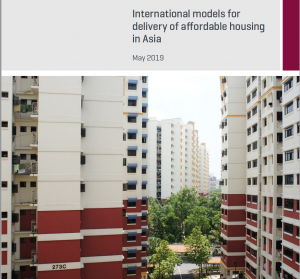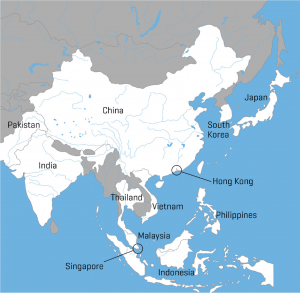
In May 2019, LSE London’s Christine Whitehead and Connie Tang from the University of Cambridge, published a report for the Royal Institution of Chartered Surveyors (RICS) entitled ‘International models for delivery of affordable housing in Asia’. The report examines affordable housing provision in a wide range of countries, cultures, scales, systems and experiences in Asia.
Asia accounts for more than 60% of the world’s population, mostly living in urban areas. It includes some countries that have been in the forefront of achieving higher housing standards for all, but the majority are struggling to put in place regulatory and administrative procedures that can more effectively meet the challenges of rapidly rising housing need and demand.
This paper provides short descriptions of the housing situation in a range of Asian countries and the initiatives that have been put in place to address the issues around achieving the goal of adequate affordable housing for all. The lack of affordability impacts poorer countries and those with thriving economies, albeit differently. The approaches to affordable housing have varied from country to country; some have been more opportunities and have more effective than others. A core issue – as has been the case in other continents – is that the Governments’ ability to address these needs requires a realistic and enforceable regulatory framework for the use of land. This in turn provides the base line for designing and implementing models of intervention such as subsidies for lower-income households.
The report provides insight into the affordable housing situation in in eight Asian countries (or regions): People’s Republic of China (China), Hong Kong (a Special Administrative Region of the People’s Republic of China), India, Japan, Malaysia, Republic of Singapore (Singapore), Republic of Korea (South Korea), and Thailand. The report also provides a brief overview of the current situation of affordable housing in Indonesia, Pakistan, Philippines, and Vietnam where there is less detailed information available. The report organises the countries based on three models of affordable housing, namely: public sector-led, private sector-led, and informal delivery. The findings based on these models include:
 “1 Public sector-led: strong public intervention in affordable housing supply with a well-developed financial system (Hong Kong, Singapore, South Korea). This model is central to the high-quality provision of affordable housing in Hong Kong and Singapore. Public intervention also dominated the position in South Korea for decades after the war. However, in recent times there has been a declining role for South Korea’s central government.
“1 Public sector-led: strong public intervention in affordable housing supply with a well-developed financial system (Hong Kong, Singapore, South Korea). This model is central to the high-quality provision of affordable housing in Hong Kong and Singapore. Public intervention also dominated the position in South Korea for decades after the war. However, in recent times there has been a declining role for South Korea’s central government.
2 Private sector-led: strong private sector involvement in affordable housing supply, with a developed financial system for both developers and consumers. This group includes China, Japan, Malaysia and Thailand, all of whom have (or, in the case of Japan, had) significant affordable housing policies. China is atypical in this group, because it has government-owned land, but market players dominate housing provision and allocation in all four countries.
3 Informal delivery model: dominated by informal housing systems and underdeveloped financial systems, even though there are some government policies in place. This group includes India, Indonesia, Pakistan, the Philippines and Vietnam, as well as other countries not included in the study (such as Bangladesh)”.
Importantly, whichever model is in operation, owner-occupation is seen as the long-term goal throughout Asia – even in countries where governments have a history of direct involvement in land allocation and housing investment.





